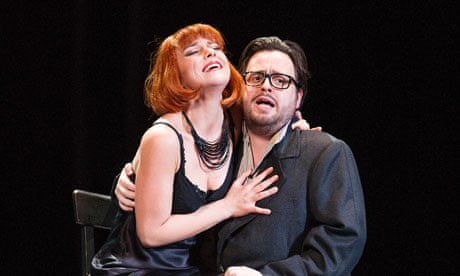When Peter Konwitschny's Traviata was first seen in Graz two years ago, the director claimed that Violetta was "the only human being" in the opera. It's clear from the production's opening moments at the Coliseum that for Konwitschny the society that Verdi's heroine inhabits is one of ruthless exploitation and voyeuristic hypocrisy, in which Corinne Winters' mannequin-like Violetta is as much an outsider as Ben Johnson's gauchely bookish, bespectacled Alfredo, who is viciously teased by the party-going rabble when he attempts to propose a toast to her.
It's Konwitschny's first show in the UK, and a real coup for English National Opera to have finally persuaded one of Europe's leading opera directors to work in London. They have been rewarded with a totally convincing piece of music theatre, which tightens and intensifies Verdi's score musically as well as dramatically. This version, conducted by Michael Hofstetter, has lost all its ballet music and some aria repeats, reducing the running time to 110 minutes – there are no intervals. Visually it's pared right down too – the costumes are late 20th-century, while Johannes Leiacker's set consists of a single chair and successive rows of red curtains with carefully painted trompe l'oeil pleats; but even those are pulled down at the end of the second act, leaving Violetta to die on an empty stage littered with the detritus of Flora's party.
Every detail signifies, whether it's the use of the auditorium to represent the bourgeois world outside, or Violetta's exchange of party clothes and wigs for lumberjack shirt and trousers to signal her transformation from brittle courtesan to contented country wife. When Anthony Michaels-Moore's Germont intrudes on the country idyll, he drags along his cowed, plain daughter, both to reinforce his emotional blackmail and also to underline his violent, domineering control of his family. None of it is comfortable to watch, but it's all compelling, and sometimes curiously moving, as when Violetta and Alfredo begin their final duet by drawing the curtains that are no longer there, as though trying to recapture the world that they have lost.
Vocally only Michaels-Moore, who can be rather metallic and shouty, is a disappointment, and both Winters and Johnson are exceptional. Her performance is a wonderful combination of feistiness and fragility, sung with unflagging intensity; while he continues to be more impressive with every new challenge he takes on. They make an odd couple, just, I suspect, as Konwitschny intended.

Comments (…)
Sign in or create your Guardian account to join the discussion